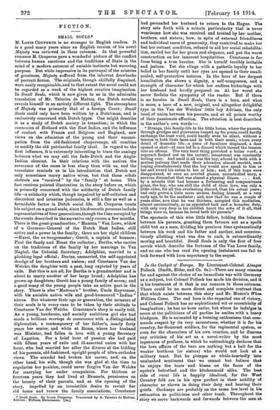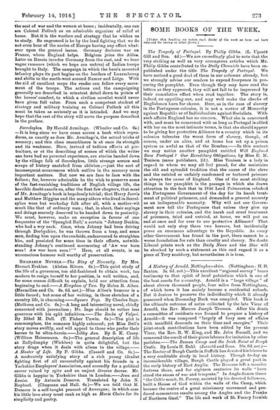In the Cockpit of Europe. By Lieutenant-Colonel Alsager Pollock. (Smith,
Elder, and Co. 6e.)—There are many reasons for and against the choice of an immediate war with Germany as a subject, but Colonel Pollock has made his decision, and it is his treatment of it that is our concern in these columns. There could be no more direct and complete contrast than that which exists between this story and Mr. Munro's When William Came. The end here is the expected one of victory, and Colonel Pollock has no sophisticated wit or eccentricity of imagination; he has no keen satire, but where he indulges in scorn at the politicians of all parties he smites with a heavy bludgeon. He is animated by a burning enthusiasm that com- mands respect by its very earnestness, whether it is for his country, for Somerset soldiers, for the regimental system, or even for the characters of his own creation, and he disarms any criticism of his art as a novel-writer by the most ingenuous of prefaces, in which he unblushingly declares that the love affairs of the hero are nothing but a bait for the weaker brethren (or sisters) who would not look at a military tract. But be plunges so whole.heartedly into unabashed sentiment that we cannot but believe that be enjoys the tears and kisses on the faces of the squire's betrothed and the kitchenmaid alike. The best side of rural life is happily idealized, for the West Country folk are in his eyes perfect in their nobility of character as shown in doing their duty and bearing their griefs. Cockneys are probably on the same low level in his estimation as politicians and other trash. Throughout the story we move' backivards and forwards between the men at
the seat of war and the women at home; incidentally, one can see Colonel Pollock as an admirable organizer of relief at home. But it is the warfare and strategy that he wishes tui to study. So engrossed is be by the land fighting that we do not even hear of the navies of Europe having any effect what- ever upon the general issues. Germany declares war on France, whom England helps. Belgium joins the Allies. Later on Russia invades Germany from the east, and we hear vague rumours (which we hope are untrue) of Indian troops brought to Italy. The campaign in which the hero's mounted infantry plays its part begins on the borders of Luxembourg and shifts to the north-west around Namur and Liege. With the aid of excellent maps the reader can follow every move- ment of the troops. The actions and the campaigning generally are described in minutest detail down to paints of the horses' comfort, to which a civilian novelist would never have given full value. From such a competent student of strategy and military training as Colonel Pollock all this must be taken as seriously as it is intended. And we may hope that the rest of the story will serve the purpose described in the preface.







































 Previous page
Previous page